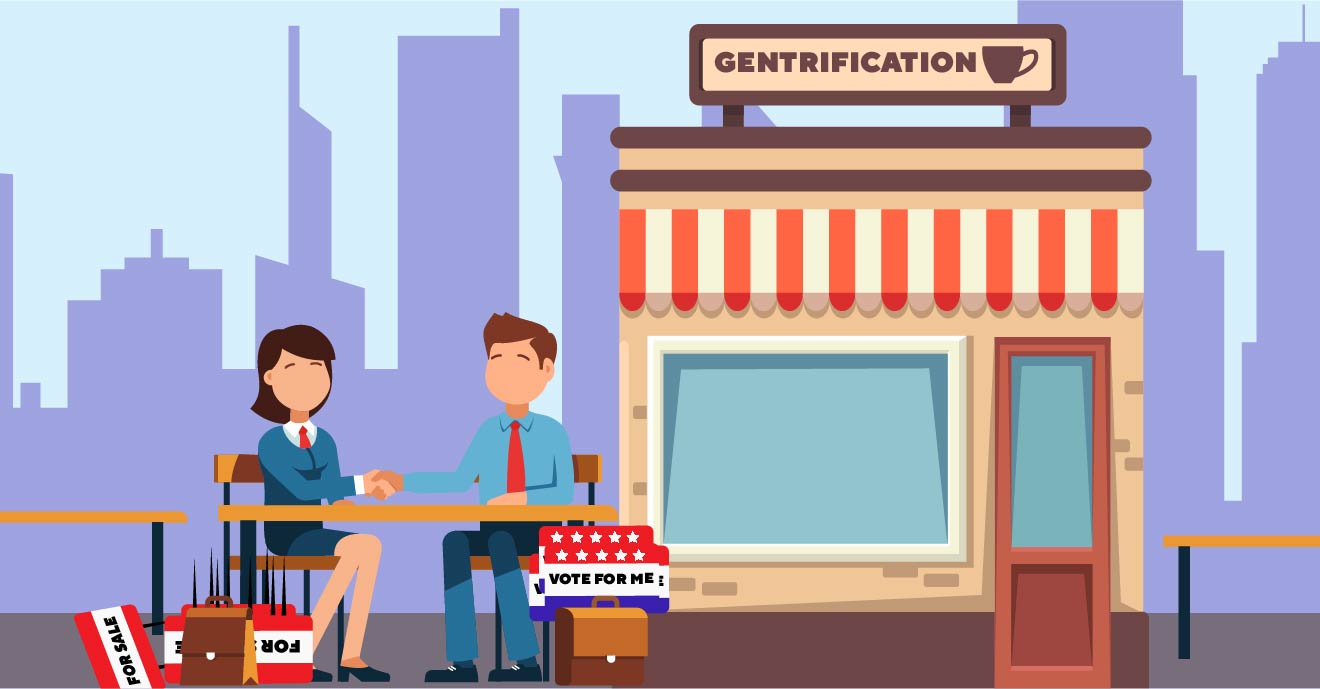Gentrification is heading full speed to a neighborhood near you. Many housing activists and local residents have protested against displacement and gentrification in their neighborhoods, from the Bronx to San Diego. Yet, developers are still buying up land and raising the property values, particularly in Black, low-income neighborhoods. According to CityLab, gentrified neighborhoods lost an average of 593 Black people per tract between 2000 and 2013. Cities, such as Atlanta, Baltimore, Philadelphia and New Orleans, lost much more than the average.
Unfortunately, politicians have been contributing to gentrification through their political power. Many cities and state officials do not take their residents into account when making political moves about housing. Instead, they cater to developers to get more houses built as a remedy for the symptoms of high rent and increasing property values. Rather than passing laws that focus primarily on affordable housing or providing heavy oversight on banks, these politicians play into the hands of real estate in exchange for more money for the state, however temporary it may be.
Here are five ways politicians are contributing to the gentrification and displacement of Black residents.
1. Passing legislation that favors displacement
Many state governors sign bills that allow for more housing to be built, especially if there is no housing growth in a particular area. These bills are meant to serve as a solution to the housing crisis as more people pour in to live in big cities. However, more development often comes with high costs, usually in the form of rent to tenants. In these housing bills, affordable housing is not thoroughly defined, leaving developers with no responsibility for building low-income units. For example, in 2007, Chicago passed the Affordable Requirements Ordinance, which required private developers to carve out 10% of its total units for affordable housing. If they did not want to build affordable housing units, they had the option of paying a fee between $128,000 to $178,000 to the city for them to continue building. Most developers paid the fee, which raised over $100 million for affordable housing. Unfortunately, only 450 affordable units have been built since 2007.
2. Accepting money from real estate developers
Unfortunately, it is 100% legal for politicians to take money from real estate developers. California State Senator Scott Wiener has received backlash for accepting money from real estate developers and architects. For his 2016 Senate campaign, he received $574,276 from about 700 donations from real estate giants. He not only beat his opponent, Jane Kim, but he also introduced housing laws that catered to developers. He gained infamy for introducing his failed SB-827 bill, which would have allowed developers to forgo local building restrictions and requirements and receive a bonus from the city if the units were near transit areas. Wiener’s SB-50, another housing bill similar to the last, has been postponed until 2020.
3. Not regulating banks that sell houses in low-income communities to affluent buyers
With little regulation, big banks have been getting away with hurting Black and poor tenants for decades with credit discrimination and displacement after mortgage lending. According to a study conducted by the National Community Reinvestment Coalition, Washington D.C. is the most gentrified city in the United States. The city's population is more than 47% Black and has experienced gentrification of varying degrees in 40% of its neighborhoods. D.C.’s Community Reinvestment Act may be a major contributor, as its federal regulators give banks a good rating when they give out mortgage loans in low-income, historically underserved neighborhoods. This rating helps banks when they seek approval from regulators for expansion and mergers. However, the money isn’t ending up in the hands of the residents who live in these neighborhoods. In D.C., over 65% of mortgage loans went to folks whose incomes were more than 80% of the local median in 2017, according to Politico.
4.) Using the improvement of public transportation to kick people out of cities
It is a well-known practice among those in the real estate game to buy up property that's near public transportation, such as trains and subway stations. However, the city’s plans to build more public transportation usually come at a cost to low-income neighborhoods. For example, the city of Atlanta has started constructing the BeltLine, a 22-mile pedestrian and biking path throughout the city. Since its construction, low-income Black neighborhoods have seen a 68% rise in their median sale prices. With no protection given by politicians for homeowners and renters, Black people are being pushed out of their own neighborhoods due to rising rent caused by the BeltLine. The same has occurred with the new construction of public transportation in New Orleans and Philadelphia.
5.) Rezoning
Politicians believe that by changing the zoning laws to allow for more housing, developers will not have to price their properties so high due to scarcity of land. However, this is a false dichotomy and, instead, leads to gentrification. In Brooklyn, politicians were sued by housing activists for displacing nearby Black and Latinx residents due to the rezoning of its Broadway Triangle. However, city officials were not held responsible after the Manhattan Supreme Court ruled that they did not have to take racial impact into account when rezoning.
Although politicians aren’t the main perpetrators of gentrification and displacement, they play a huge role in deciding what big banks and real estate giants are allowed to do. The housing crisis in big cities does not get solved by playing into the hands of developers. It, instead, is conquered by showing concern for its low-income residents. Affordable housing should be a top priority for city officials when passing legislation. Politicians also need to be held accountable for the power they wield in increasing living costs and removing people from their own neighborhoods.
